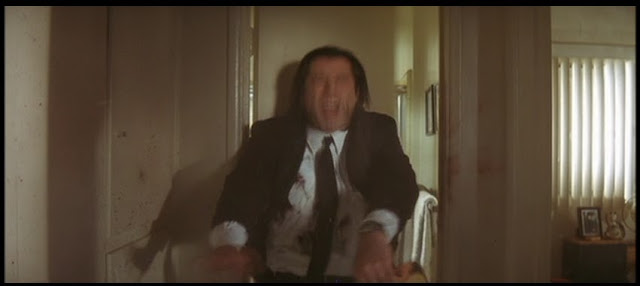
Above left: Recall from earlier in the analysis, that there is a flash of orange-golden colored light in Brett's apartment, while Jules is shown shooting Brett. Above right: Also recall that there is a second orange-golden flash while we see Vincent shooting Brett.
As previously described, we know that Jules undergoes a religious conversion during the movie, somewhat similar to the conversion to Christianity that the apostle Paul underwent when he saw a bright light (and heard the Lord's voice) while on the road: As stated earlier, the first flash of light during the scene in Brett's apartment, is a metaphorical representation of the light that Paul saw. Jules' subsequent statement to Vincent that he had witnessed a miracle when he and Vincent were completely missed by several gunshots fired at them at point blank, and that he would quit being a hit man and instead "wander the Earth", is the indication that he has been converted (although apparently, not necessarily to Christianity; but at least, to a better kind of man).
Vincent, however, is not converted by the experience of being completely missed by the bullets.
The movie-makers want us to see Vincent as an evil and incompetent person, one who has a chance to redeem himself but fails.


The portrayal of Vincent as incompetent includes the scene in which he is shot dead by Butch Coolidge in Butch's apartment, upon opening the door to Butch's bathroom after having just used the toilet (top left); the scene in which he is in the Wallace bathroom (top right) while Mia is inhaling heroin, thinking it is cocaine (above left); and the movie-ending diner scene, in which Vincent is again caught idling in the bathroom, this time while the diner is being held up (above right).
Vincent's chance for self-redemption comes when he is trying to save Mia's life in Lance's house, and although he initially seems to do so, in the final analysis, he fails: Even though Mia seems to 'come back to life' after an injection of adrenaline administered by Vincent, she is subsequently shown with a white, 'ghostly' complexion when returning to her house with Vincent; this is meant to represent her as still being 'dead' in some sense, i.e., as not 'fully saved'. As we will see later in the analysis, Mia represents the woman (i.e., the female component) within Vincent, and therefore, Vincent's failure to completely save Mia ultimately represents his failure to save the feminine within himself, and it is in this sense that he fails to save himself.
The movie-makers want us to see Vincent as an evil and incompetent person, one who has a chance to redeem himself but fails.


The portrayal of Vincent as incompetent includes the scene in which he is shot dead by Butch Coolidge in Butch's apartment, upon opening the door to Butch's bathroom after having just used the toilet (top left); the scene in which he is in the Wallace bathroom (top right) while Mia is inhaling heroin, thinking it is cocaine (above left); and the movie-ending diner scene, in which Vincent is again caught idling in the bathroom, this time while the diner is being held up (above right).
Vincent's chance for self-redemption comes when he is trying to save Mia's life in Lance's house, and although he initially seems to do so, in the final analysis, he fails: Even though Mia seems to 'come back to life' after an injection of adrenaline administered by Vincent, she is subsequently shown with a white, 'ghostly' complexion when returning to her house with Vincent; this is meant to represent her as still being 'dead' in some sense, i.e., as not 'fully saved'. As we will see later in the analysis, Mia represents the woman (i.e., the female component) within Vincent, and therefore, Vincent's failure to completely save Mia ultimately represents his failure to save the feminine within himself, and it is in this sense that he fails to save himself.


Top left: Vincent, stooped over a near-dead Mia, gestures in impatience to Lance (wearing bathrobe). Top right and above left: Mia is revived by an adrenaline injection. Above right: Later, Mia has a 'ghostly' complexion upon returning home after her 'date' with Vincent.

It is evident that Vincent (above left) is not converted by the experience in Brett's apartment, when he later tells Jules (above right), during the diner conversation between the two men, that he views being missed by the gunshots not as a miracle, but as a coincidence. Vincent also makes derogatory statements to Jules in response to Jules' statements about his plans for the future, calling Jules a "bum" for wanting to quit the business (i.e., to quit being a hit man) and wander the Earth.
One must wonder, if Vincent is killed by Butch, why Vincent reappears in the diner scene at the end of the movie. The reason for this has to do with the 'skewing' of time in the movie (i.e., the movie's being chronologically non-linear): The second diner scene actually takes place before the scene in Butch's apartment. At least part of the reason that we, the audience, are shown these two scenes in reverse chronological order is to convey the idea that in some metaphorical sense, Vincent has been 'resurrected'.





